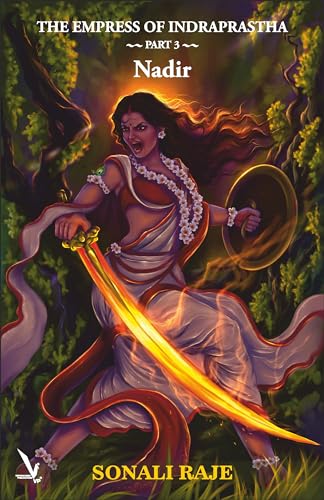Series: The Empress of Indraprastha #3 (Not a standalone)
Publication Date: 24th May 2024
Genre: Historical Fiction, Retelling
3.8 Stars
One Liner: A good one
Yudhistira loses the game of dice, which leads to gut-wrenching consequences for the Pandavas. Draupadi bears the brunt of the situation more than once. However, she does what needs to be done and spends the thirteen-year exile with her husbands.
The third book in the series deals with events from the second half of Sabha Parva, Aranyaka (Vana) Parva, and Virata Parva of the Mahabharata.
The story comes in Draupadi’s first-person POV.
My Thoughts:
Like the previous book, this too starts with a note stating that the story is a fanfiction retelling of the Mahabharata and has elements from various versions, including the creativity of the author.
The book covers a large period by keeping the events brief and maintaining a steady pace. At the same time, we meet new characters and come across scenes that linger with us for a long time afterward.
I particularly like Ashwinkarni (a ten-year-old tribal girl) and Draupadi’s interaction with Hidimbi (Bhima’s rakshasi wife). I’ve always wanted a scene with these two women meeting and enjoyed how this is handled.
As someone who is not a fan of Yudhistira, I was happy to see him get a good lashing for his strange (restricted) perspective of dharma. Krishna too has a more serious role given the circumstances, but he manages to bring some lighthearted moments.
What I like so far about the series is that it doesn’t strip the main characters of their layers and turn them into mouthpieces to shout the author’s words. It balances sensitive topics while retaining the essence of the original. Moreover, some characters like Uttarā get an extra spark, which enhances their presence in the overall narrative.
I admit I love the portrayal of Draupadi and Arjuna’s relationship. The extra flavor added by the author makes it heartwarming.
The order of the events has been changed to suit the narrative. Not a major concern since the main ones are covered; some in brief and some in detail.
While I like the inclusion of specific social themes in each book (and this one deals with a very important topic), it feels a bit preachy the way the dialogues are worded. I’d have liked it more if some of it was a bit subtle and showed us the impact rather than relying on lengthy dialogues.
There’s heavy foreshadowing about Karna (as it seems to be a thing with the series), which could go either way. I wasn’t a fan of it but those who haven’t read the original might like those hints.
To summarize, Nadir is the third book in the five-part series that presents a fictional retelling of the Mahabharata from Draupadi’s POV. The book is an easy read despite the dark topics it handles and manages to be respectful toward the epic while highlighting the flaws of the characters.
I hope the next book details the wedding of Abhimanyu and Uttarā. It would be entertaining to read. Also, I’m curious to see how the author will present the war scenes from Draupadi’s first-person POV.
Read my reviews of book one and book two.


No comments:
Post a Comment